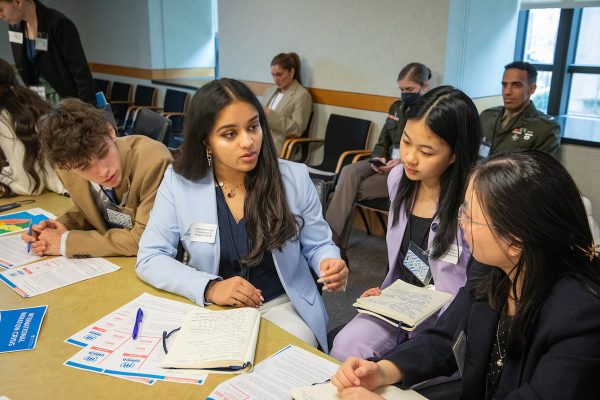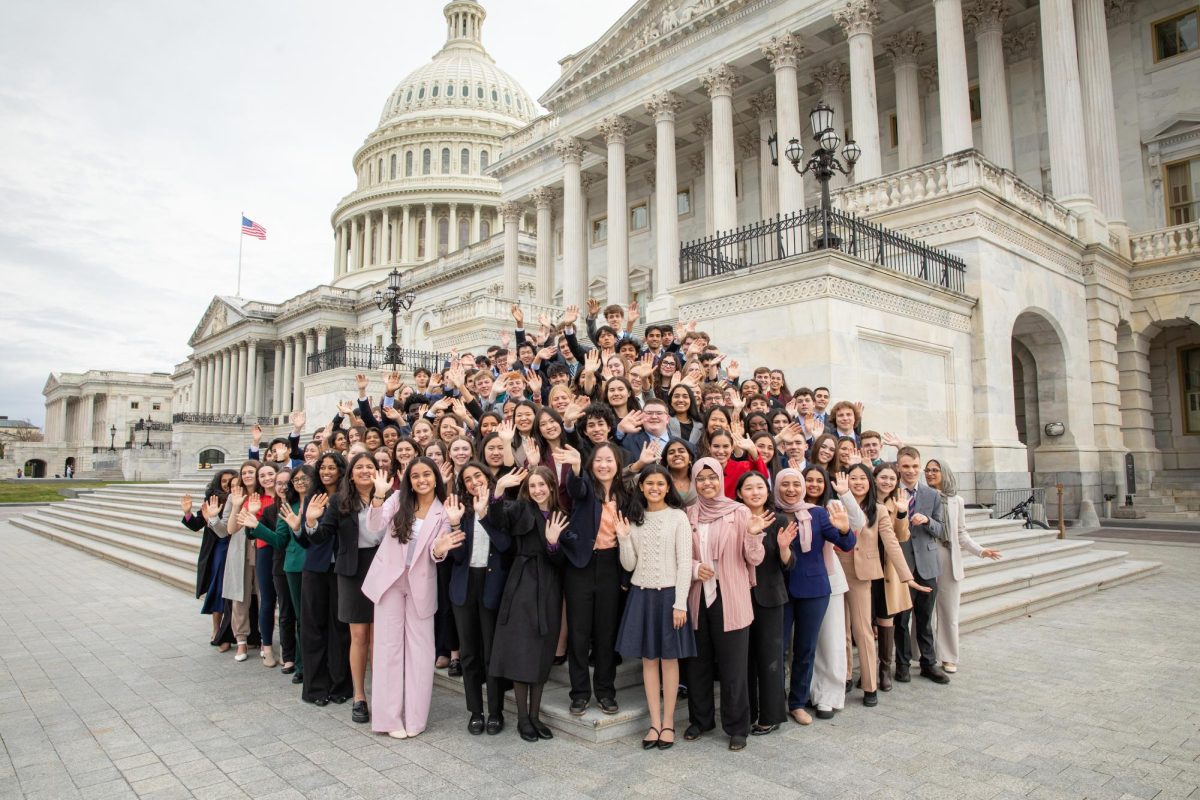Two weeks ago, I had the privilege of being selected as one of two delegates from Michigan to attend the 62nd annual United States Senate Youth Program. I once thought that the experience of receiving my “Congratulations!” email from the Michigan Board of Education, confirming my selection as their first choice for the program, would be the most exciting moment of my life; I was soon proven wrong.
Established by the Hearst Foundations in 1962, the United States Senate Youth Program was created to bring together 104 of the nation’s top young political leaders to not just learn about all aspects of the United States government, but engage with them to the highest extent. Two delegates are selected by each of the 50 state’s Department of Education, in addition to the U.S. Department of Defense (DoDEA) and the District of Columbia. This scholarship program brings together delegates for “Washington Week,” a week-long immersive program to “hear major policy addresses by senators, cabinet members, officials from the Departments of State and Defense and directors of other federal agencies, as well as participate in meetings with the president and a justice of the U.S. Supreme Court,” according to the United States Senate Youth Program Website, as well as receive a $10,000 merit scholarship. This year, we heard from dozens of esteemed political figures, a few being the President of the United States, the First Lady of the United States, Secretary of State Antony Blinken, U.S. Supreme Court Justice Elena Kagan, Secretary of Transportation Pete Buttigieg, and many more. The selection for this program is rigorous, with multiple written applications, timed essays, tests, interviews and thousands of applicants each year.
Escorted into the Mayflower Hotel by 17 military mentors, I was instantly immersed in a historical landmark that has hosted dozens of international political and diplomatic figures. I was met by my military mentor, Captain Amelia Weaver of the United States Army, who shaped my Washington Week experience and guided me on what leading with service truly means. She shared narratives from each of her deployments and humanitarian missions and how they taught her about the vastness of the U.S. military in protecting democracy abroad and even more about humanity. Each of the 17 military mentors of the joint force team were selected by the Department of Defense to be a mentor for this program, showing their dedication and commitment to ensuring every delegate learns about our government safely. At each dinner, we were seated with a military mentor, who shared their own experiences serving our nation, while also advising us on our own educational endeavors. While Captain Hannah Durbin now serves in the United States Air Force, she is a University of Oxford graduate who studied philosophy. 1st Lieutenant Katherine Kroliki studied government at Harvard University, and is also a former United States Senate Youth Program Delegate. Each and every military mentor has a diverse background, and along with it, many reasons for joining their respective branches of the U.S. Military. From learning that Captain Joseph Puntoriero helped draft a new constitution in Lebanon, to listening to Captain Weaver’s missions in Guatemala, these military mentors left us with meaningful words of advice.
From early morning breakfasts with U.S. Senators to watching the 2024 State of the Union live from the White House late at night, each day was jam-packed with adventure, knowledge and a new perspective on government. Deep in the heart of our country, in institutions like the White House, U.S. Supreme Court, Pentagon, Department of State, the National Archives, the Library of Congress and Department of Justice, to name a few, I shared the incredible opportunity of Washington Week with 103 other delegates who strive for a more perfect union each and every day. While we often think of government as fixed and unchanging, my experience in Washington, D.C. taught me the opposite: our government is a living, breathing, complex entity. It is impressionable and will grow to reflect the actions, conversations, votes and dreams we feed it. I noticed this most when hearing from Assistant Attorney General (AAG) Kristen Clarke at the Department of Justice, who shared the complexity of cases they encounter. Majority of them require working with other agencies, from the Drug Enforcement Administration to the Environmental Protection Agency. AAG Clarke expanded on how the Department of Justice is actively working to investigate hate crimes, especially those happening against students in schools. The Department of Justice’s work however, is extensive, and many cases involve public health, education, and environmental policy. One landmark case AAG Clarke noted, is a civil rights investigation which targeted the Alabama Department of Public Health, which failed to protect low socioeconomic Black residents in Lowndes County who were left without access to a sewage system. The U.S. Department of Justice worked with the Department of Health and Human Services and found that Alabama neglected the issue, posing immense health risks to the community, and therefore an extreme civil rights issue. AAG Clarke noted that under an agreement with the Department of Justice and Department of Health and Human Services, the Alabama Department of Public Health must take extensive measures such as “determining appropriate septic and wastewater management systems” and “ creating a plan to improve access to adequate sanitation systems and address public health risks associated with raw sewage exposure” to address the public health crisis in Lowndes County according to the Department of Justice press release. This case is just one of many that exemplify how the U.S. government is not one entity, but an interconnected and vast system that seeks to protect every community.

A common theme throughout this week was reducing political polarization through listening to the other political party. Multiple senators shared the importance of working together with opposing political parties to come to a compromise on legislation, rather than a gridlock, a word that is broadly emblematic of the current state of the U.S. government. They expressed hope for our generation to keep an open mind to anyone and everyone’s political views, for they are a summation of each individual’s lived experiences. At the United States Supreme Court, we had the honor of meeting Supreme Court Justice Elana Kagan. Surprisingly, Justice Kagan noted that she is closest with her colleague, Supreme Court Justice Antonin Scalia, despite their opposing political views. As Supreme Court Justices, I wondered how Justice Kagan and Justice Scalia are able to maintain a sincere relationship while working on cases that determine the fate of millions of U.S. citizens, and set precedent for years to come. I asked this question, and Justice Kagan emphasized the importance of setting political views aside from personal relationships, especially considering all Justices have to work together for years, even decades, due to their lifetime appointments. Justice Kagan shared a light-hearted anecdote from a time when she and Justice Scalia went hunting, and told us that “it’s hard to hate someone when you know their heart,” a quote that is broadly emblematic of all her relationships with each of the other 8 Justices.
From hearing from accomplished individuals like the President of the United States Joe Biden and Secretary of State Antony Blinken to having breakfast with Secretary of Transportation Pete Buttigieg and lunch at the Pentagon with the Commander of the Joint Chiefs of Staff General Charles Q. Brown Jr., I learned that every individual, no matter how influential, started somewhere. This “somewhere” they described, is a home, school or community: a relatively mundane place colored by the conceptions of our passions and dreams. But that somewhere is still an integral part of their story. As Secretary of Transportation Pete Buttigieg stated, “The further away I got from home, the more I realized how important it was to have one: a place where I was from.” As Secretary of State Antony Blinken noted, “Having that flag behind you, literally and figuratively, there is nothing like it.”
Reflecting on this trip, I carry with me the significance of service, mindful patriotism and the essential complexities that make up our nation, all values that will allow America to grow into the equitable and free country it was designed to be. I am grateful not only for the opportunity to represent my home state of Michigan, but to experience servant leadership at the most profound level. More than anything, I’ve learned that public service is not solely about holding public office; it’s about taking an active stance to determine what your constituents need, collaborate with diverse people with different perspectives, and most of all, listen to each and every person. Each person’s political ideology is a summation of their lived experiences, and to listen and respect their view, is the foundation to our democracy.


